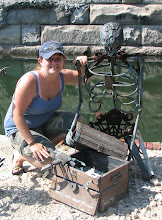 Over the decades there have countless movements in the music industry that are later degraded by the follow-up generation—disco, funk, 80s glam rock, the 90s pop, etc. One music genre that really stands out in my mind, though, is one that has been around longer than most and is still criticized for its existence to this day: country. Country is considered to be perhaps the least cool of all musical categories, and let’s face it, most of today’s younger generation would hardly admit to listening to it.
Over the decades there have countless movements in the music industry that are later degraded by the follow-up generation—disco, funk, 80s glam rock, the 90s pop, etc. One music genre that really stands out in my mind, though, is one that has been around longer than most and is still criticized for its existence to this day: country. Country is considered to be perhaps the least cool of all musical categories, and let’s face it, most of today’s younger generation would hardly admit to listening to it.I’ve listened to country music all my life; it was an integral part of my childhood from the moment I first saw artists Steve Warner and Diamond Rio at the White County fair at the age of 3 or 4. All through school I was ridiculed for my like of such “redneck” and “talentless” music, even by my own brother. Many people will admit the value of country classics such as Dolly
 Parton, Johnny Cash, and Loretta Lynn, but they don’t see that same value in today’s country artists. Others stereotype the whole genre based on “outcasts” of country like Waylon Jennings and Hank Williams, and even their recent honky tonk counterparts like Brooks and Dunn. No matter how you look at it and no matter how little you like it, you have to realize that country music defines a large part of America. From its southern folk roots to its attempts to cross over into modern pop, country music has a dedicated following in this country and it’s probably not going away anytime soon.
Parton, Johnny Cash, and Loretta Lynn, but they don’t see that same value in today’s country artists. Others stereotype the whole genre based on “outcasts” of country like Waylon Jennings and Hank Williams, and even their recent honky tonk counterparts like Brooks and Dunn. No matter how you look at it and no matter how little you like it, you have to realize that country music defines a large part of America. From its southern folk roots to its attempts to cross over into modern pop, country music has a dedicated following in this country and it’s probably not going away anytime soon.Country music has gone through lot of changes over time, but at its heart it is really about storytelling and love. When it first arose in the 20s with names like The Carters and Gene Autry, and on into the days of Johnny Cash, country was all simple tunes with powerful words. Songs like “Coal Miner’s Daughter” and “I Walk the Line” told stories about people that listeners could identify with because that’s what most country is about. Country music has never been high-tech; it’s just down-to-earth, simple music that tries to make people feel good and let them identify with the lyrics.
In the 80s and 90s county music moved more towards the way we see it today. The music picked up pace and became more mainstream. Artists such as the recently deceased Dan Seals as well as others such as Garth Brooks, Clint Black, Shania Twain, and Alabama defined this time and made country more popular. It still might not have been cool, but it certainly became more widely acceptable outside of the southern, NASCAR clientele that it is so often associated with. Even today country is still impacting the country. It has began to cross over and become more in sync with modern pop, and it thus reaching further out into the world because of groups like Rascal Flatts and female artists such as Taylor Swift and Carrie Underwood. Through these efforts country has become more acceptable in many people’s eyes, but there is still the group who hears a country song and immediately turns off the radio because they claim it all sounds a like or it requires no thought. It may not require synthesizers or have the political, literary lyrics of groups like Tool, but country has its own place in the world, and when you just want a pick-me-up or a simple break from the day, you should give it a try.


I've heard that many people universally equate the southern accent with stupidity. Because most country artists have that certain "twang," do you think this belief has anything to do with the belief that country is uncool?
ReplyDeleteI think it probably has a lot to do with it actually. People steretoype the south for so many reasons, but the accent is one of the primary ones I've encountered in my own life. Many people also complain about how predominate that southern drawl is in country music as well, but I'm hoping that as country and pop mix togetrher more some of that stereotyping may stop.
ReplyDeleteCountry music is really interesting as a genre. The first year that country was named as a genre though was the first year that the US population was more urban than rural. This is why the Southern accent comes into play in country so much I think. It is a sign of non-urbanism.
ReplyDeleteWhy do you think that it was so popular to say that you listen "to everything but country" for so long?